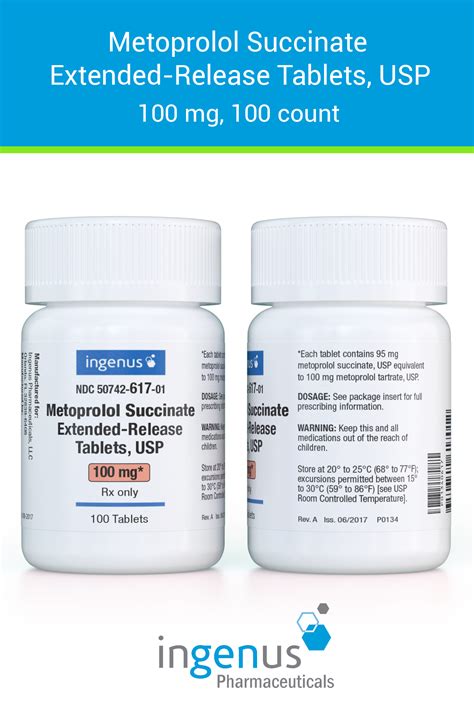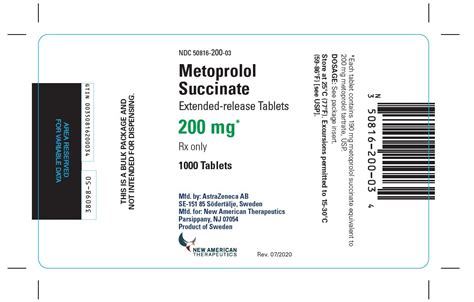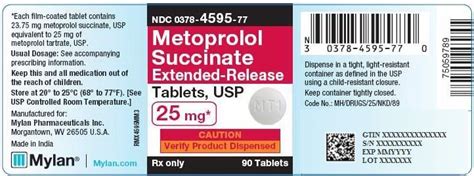Intro
Discover Metoprolol Succinate uses, a beta-blocker for hypertension, angina, and heart failure treatment, offering cardiovascular benefits and reducing blood pressure, heart rate, and myocardial infarction risk.
Metoprolol succinate is a widely prescribed medication that has been used for decades to treat various cardiovascular conditions. Its importance cannot be overstated, as it has improved the quality of life for millions of people worldwide. The medication's effectiveness in managing symptoms and preventing complications has made it a cornerstone in the treatment of certain heart-related disorders. As we delve into the world of metoprolol succinate, it becomes clear that understanding its uses, benefits, and potential side effects is crucial for patients and healthcare professionals alike.
The significance of metoprolol succinate lies in its ability to address a range of cardiovascular issues, from hypertension and angina to heart failure and arrhythmias. By exploring the medication's mechanisms, we can gain a deeper appreciation for its role in modern medicine. Moreover, as research continues to uncover new aspects of metoprolol succinate's effects on the body, its potential applications may expand, leading to improved treatment options for patients. With its established track record and ongoing investigation, metoprolol succinate remains a vital component of cardiovascular care.
As we navigate the complexities of metoprolol succinate, it is essential to recognize the medication's impact on public health. By reducing the risk of cardiovascular events, such as heart attacks and strokes, metoprolol succinate has contributed significantly to the decline in mortality rates associated with these conditions. Furthermore, its use has been shown to improve patient outcomes, enabling individuals to lead more active and fulfilling lives. As we examine the various aspects of metoprolol succinate, we will gain a more comprehensive understanding of its importance in the medical community and its potential to continue improving patient care.
Introduction to Metoprolol Succinate

Metoprolol succinate is a beta-blocker, a class of medications that slow the heart rate and reduce blood pressure. It is commonly used to treat conditions such as hypertension, angina, and heart failure. The medication works by blocking the effects of epinephrine, a hormone that stimulates the heart, and by reducing the heart's workload. This, in turn, decreases the amount of oxygen the heart requires, making it an effective treatment for various cardiovascular disorders.
How Metoprolol Succinate Works
Metoprolol succinate is a long-acting medication, meaning it is released slowly into the bloodstream, providing a steady and consistent effect. This allows for once-daily dosing, making it more convenient for patients to adhere to their treatment regimen. The medication's mechanism of action involves the blockade of beta-1 receptors in the heart, which reduces the heart rate and contractility. This, in turn, decreases blood pressure and reduces the heart's oxygen demand.Benefits of Metoprolol Succinate

The benefits of metoprolol succinate are numerous and well-documented. Some of the most significant advantages of using this medication include:
- Reduced risk of cardiovascular events, such as heart attacks and strokes
- Improved symptoms and quality of life for patients with heart failure
- Decreased blood pressure and reduced risk of hypertension-related complications
- Relief from angina symptoms, such as chest pain and shortness of breath
- Improved survival rates for patients with certain types of heart failure
Common Uses of Metoprolol Succinate
Metoprolol succinate is commonly used to treat a range of cardiovascular conditions, including: * Hypertension: Metoprolol succinate is often used to treat high blood pressure, either alone or in combination with other medications. * Angina: The medication is used to reduce the frequency and severity of angina attacks, improving symptoms and quality of life for patients. * Heart failure: Metoprolol succinate is used to treat certain types of heart failure, improving symptoms and reducing the risk of complications. * Arrhythmias: The medication is sometimes used to treat irregular heart rhythms, such as atrial fibrillation.Potential Side Effects of Metoprolol Succinate

As with any medication, metoprolol succinate can cause side effects, some of which may be mild and temporary, while others may be more severe. Common side effects include:
- Dizziness and lightheadedness
- Fatigue and weakness
- Shortness of breath
- Bradycardia (slow heart rate)
- Hypotension (low blood pressure)
Precautions and Interactions
It is essential to inform your healthcare provider about any medications you are taking, including supplements and over-the-counter medications, as metoprolol succinate can interact with other substances. Additionally, patients with certain medical conditions, such as asthma or diabetes, should use metoprolol succinate with caution.Metoprolol Succinate Dosage and Administration

The dosage and administration of metoprolol succinate vary depending on the condition being treated and the individual patient's needs. The medication is typically taken once daily, with or without food, and should be swallowed whole with a glass of water. Patients should not crush or chew the tablets, as this can affect the medication's release and absorption.
Special Considerations
Pregnant or breastfeeding women should use metoprolol succinate with caution, as the medication can pass into breast milk and affect the baby. Additionally, patients with liver or kidney disease may require adjusted dosages, as the medication can accumulate in the body and cause adverse effects.Conclusion and Future Directions

In conclusion, metoprolol succinate is a valuable medication that has improved the lives of millions of people worldwide. Its benefits, uses, and potential side effects make it an essential component of cardiovascular care. As research continues to uncover new aspects of metoprolol succinate's effects on the body, its potential applications may expand, leading to improved treatment options for patients.
What is metoprolol succinate used for?
+Metoprolol succinate is used to treat various cardiovascular conditions, including hypertension, angina, heart failure, and arrhythmias.
What are the common side effects of metoprolol succinate?
+Common side effects of metoprolol succinate include dizziness, fatigue, shortness of breath, bradycardia, and hypotension.
Can metoprolol succinate be used in combination with other medications?
+Yes, metoprolol succinate can be used in combination with other medications, but patients should inform their healthcare provider about all medications they are taking to avoid potential interactions.
We invite you to share your thoughts and experiences with metoprolol succinate in the comments below. If you have any questions or concerns, please do not hesitate to ask. Additionally, if you found this article informative and helpful, please share it with others who may benefit from this information. By working together, we can continue to improve our understanding of metoprolol succinate and its role in cardiovascular care.
